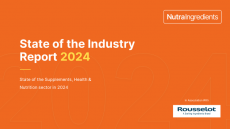Arla’s low-protein infant formula offers results similar to breast milk feeding

Published in the journal Nutrients, the study reported on the results of a 12-month follow-up of a randomized controlled trial conducted in 245 healthy-term infants. It found that infants fed a modified low-protein formula maintained similar growth to that of breastfed infants than those consuming a standard formula with higher protein concentration.
The authors from Sweden, Denmark and the UK concluded that improving protein quality and reducing concentration may be a strategy for early prevention of childhood overweight and obesity.
Getting the right concentrations
Formula-fed infants have increased risks of becoming overweight or obese during childhood and adolescence, as well as being more susceptible to type two diabetes in later life.
This could be attributed to increased protein concentrations in infant formula, as EU regulation states protein concentration cannot fall below 1.8g per 100 kcal to mitigate the risk of inadequacy in essential amino acid quantities. In comparison, breast milk contains 1.5 g protein per 100 kcal.
Alpha-lactalbumin (a-lac), the major whey protein in breast milk accounting for approximately 25% of the total protein content (2.5–3.0 g/L), or about 36% of the whey protein, is still low in standard infant formulas due to its lower concentration in bovine milk (3.5% of total protein or 17% of the whey protein).
However, α-lac in human and bovine milk exhibits a similar and favorable amino acid composition, especially abundant in tryptophan and cysteine, and previous research suggests it supports growth in line with age expectancy, energy efficiency and gastrointestinal resilience.
The authors of the study therefore suggested that increasing its concentration in formula could enable positively affect the weight outcomes in formula-fed infants.
Study details
The participating infants received low-protein formulas with either alpha-lactalbumin-enriched whey (α-lac-EW; 1.75 g protein/100 kcal), casein glycomacropeptide-reduced whey (CGMP-RW; 1.76 g protein/100 kcal) or standard infant formula (SF; 2.2 g protein/100 kcal) between two and six months of age, while breastfed infants served as a reference.
The follow-up period included study visits at one and two years of age. During these visits, anthropometry and body composition measurements were performed, and serum was analyzed for insulin, C-peptide and insulin-like growth factor 1 (IGF-1).
Results showed that weight gain between six and 12 months and BMI at 12 months were higher in the standard formula than in the breastfed infants but were not significantly different between the low-protein formula groups and the breastfed group.
Additionally, S-insulin and C-peptide were higher in the standard formula than in the breastfed group but more alike in the low-protein formula groups and the breastfed group. Serum IGF-1 at 12 months was similar in all study groups.
“Feeding modified low-protein formula during early infancy seems to reduce insulin resistance, resulting in more similar growth, serum insulin and C-peptide concentrations to breastfed infants at 6-months post-intervention,” the authors concluded.
The study found that serum insulin at 12 months was associated with weight gain (g/d) between 6 and 12 months, suggesting potential imprinting of insulin secretion by protein intake during the intervention period.
While the authors noted that "previous follow-up studies found no associations between insulin concentrations at the end of intervention and growth post-intervention up to two years", the new study had included blood sampling which could suggest a more thorough assessment of insulin resistance.
Journal: Nutrients
doi: 10.3390/nu16071026
“Low-Protein Infant Formula Enriched with Alpha-Lactalbumin during Early Infancy May Reduce Insulin Resistance at 12 Months: A Follow-Up of a Randomized Controlled Trial.”
Authors: Nilsson, U. et al.











